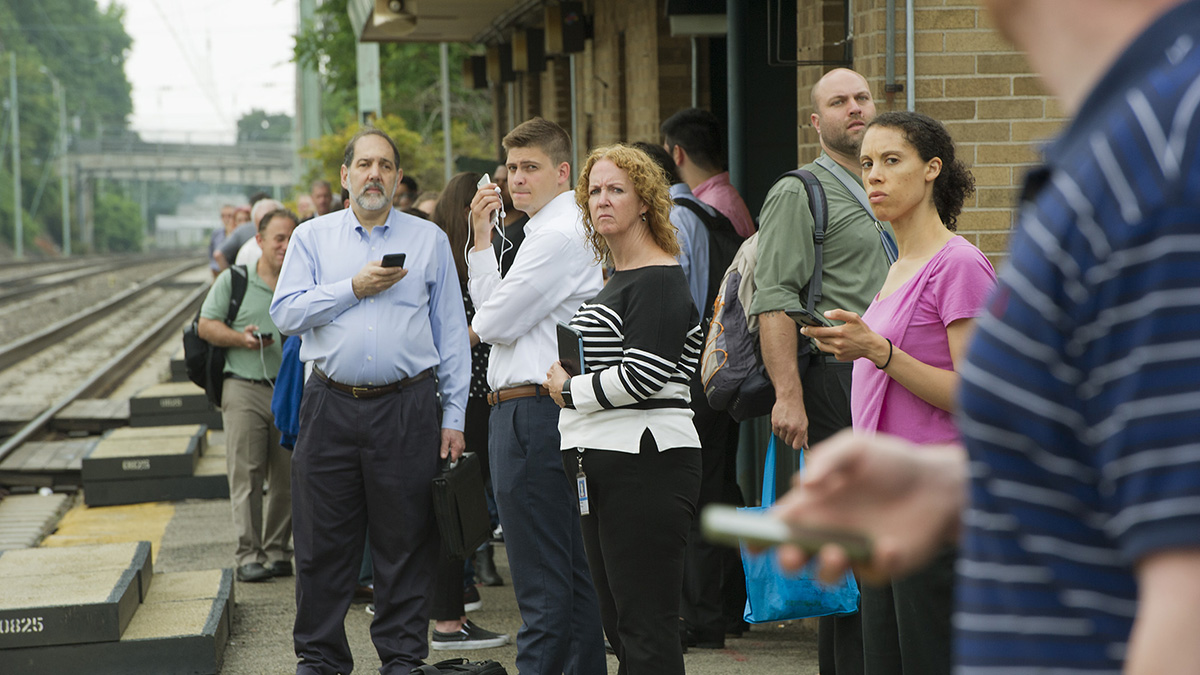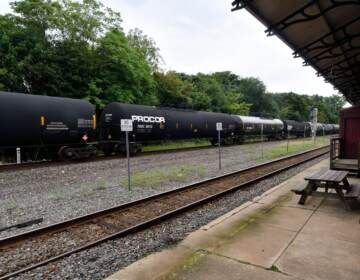Silverliner silver lining: SEPTA leases trains to ease Regional Rail crunch, which will last past Labor Day

It’s great to have good neighbors, someone whose door you can knock on unexpectedly to borrow a cup of sugar.
Thankfully for SEPTA and its Regional Rail riders, SEPTA has some good neighbors. With a third of its regional rail fleet grounded by a widespread defect found on nearly every Silverliner V railcar, SEPTA is turning to Amtrak, NJ Transit and the Maryland Area Regional Commuter (MARC) to lease 18 railcars and three locomotives. Starting Monday, the three additional trainsets will provide 1,700 sorely needed seats.
Neighborly affection for the City of Brotherly Love’s Silverliner riders provided a silver lining to an otherwise gray press conference Friday. SEPTA General Manager Jeff Knueppel warned that the cars’ cracked equalizer bars would probably need to be replaced, not merely repaired, meaning that limited service would likely last past Labor Day.
Starting Monday, Regional Rail lines will begin a new interim weekday schedule, replacing the modified Saturday schedule used this week. The new schedules will be posted on SEPTA’s website Sunday afternoon. SEPTA is also restoring regular Saturday and Sunday service schedules this weekend, and the Airport line will return to regular service with 30 minute headways.
SEPTA is still trying to figure out the exact cause of the cracks, Knueppel said, but the metallurgical testing and finite element analysis so far “suggests that a repair might not be possible.”
Equalizer bars aren’t the sort of part you can just pick up off a shelf somewhere. Knueppel said that Hyundai Rotem, the manufacturer that built the still-under-warranty Silverliner Vs, had already identified a steel supplier for the equalizers.
In response to the crisis, SEPTA has opted to run longer trains on some lines—putting upwards of eight cars together, instead of three or four. As a result, while the number of daily Regional Rail trains has dropped to 549 from 788 before the defect was discovered last Friday, the number of car trips has only dropped to 1,783 from 1,843. Still, trains during the morning and evening rush hours are cramped: one longer train cannot make up for two shorter trains.
The borrowed trains will be pressed into service on three lines. A five-car-long MARC train and an eight-car-long NJ Transit train will operate on the Trenton line. Eight cars is longer than platforms at Torresdale, Cornwells Heights and Levittown stations, so this weekend SEPTA will also elongate those platforms. Knueppel said the construction entails some simple paving and should be completed before Monday’s morning commute.
The Amtrak cars will be pressed into service along the Thorndale/Paoli line, primarily to provide quick turnaround service between Bryn Mawr and Philadelphia during rush hour.
The borrowed cars will allow SEPTA to move some trains around to provide additional service on the West Trenton, Warminster and Lansdale/Doylestown lines.
Knueppel said that SEPTA was continuing to look for loaner trains from other transportation agencies across the Northeast.
Knueppel stressed that the authority was focused on identifying the cause of the defect, fixing the problem, and returning to normal service as soon as possible. In the meantime, the authority doesn’t have a firm grasp on the ridership or revenue impact this unprecedented crisis is having.
SEPTA has postponed work on its trolley tunnels and suspended the procurement of new bi-level Regional Rail cars to focus energies on the Silverliner V fiasco. Hyundai Rotem is one of three bidders for the bi-level car contract.
“The problem is very substantial,” said Knueppel. Of the 120 Silverliner V cars, 115 had defects. Each car has two trucks, which connect wheels and suspension to the cabin above, and each truck has two equalizer bars. Of 240 trucks, 203 had at least one cracked equalizer bar, and a total of 264 equalizer bars were cracked.
The loaner trains will be expensive, as will be the replacement equalizer bars, platform construction, employee overtime, lost revenue from reduced ridership, and other emergency measures SEPTA’s taking. At this point, SEPTA cannot say how much this crisis will cost. “In the end… this is millions of dollars,” said Knueppel.
WHYY is your source for fact-based, in-depth journalism and information. As a nonprofit organization, we rely on financial support from readers like you. Please give today.




